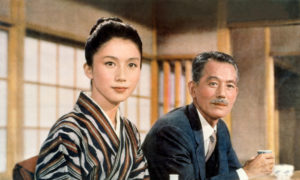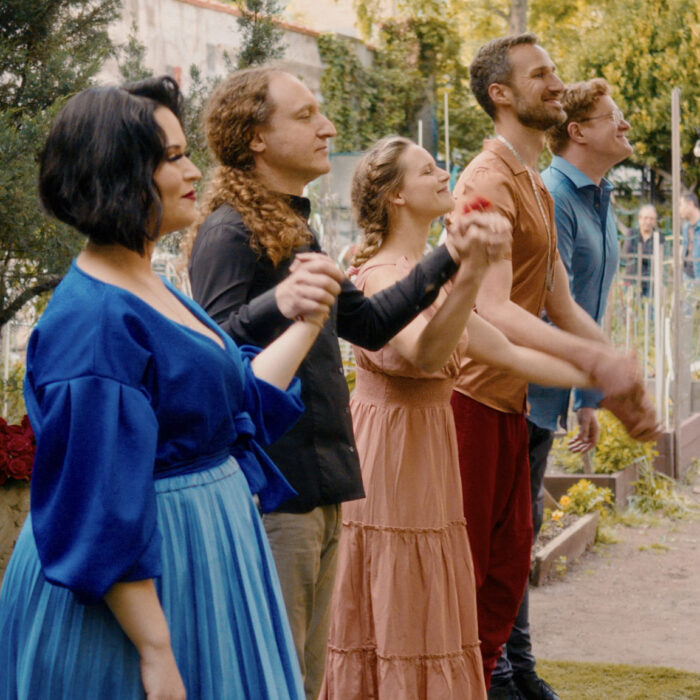
Opera Meets Film: How ‘Caro Mio Ben’ Informs Theme Through Counterpoint in Yazujiro Ozu’s ‘An Autumn Afternoon’
By David Salazar“Opera Meets Film is a feature dedicated to exploring the way that opera has been employed in cinema. We will hone in on a selection or a film in its entirety, highlighting the impact that utilizing the operatic form or sections from an opera can alter our perceptions of a film that we are viewing. This week’s installment features opera in Yazujiro Ozu’s “An Autumn Afternoon.”
Yazujiro Ozu’s “An Autumn Afternoon” is an ode to loneliness in old age.
At the center of it all is widower Shuhei Hirayama who is being pressured to marry off his daughter Michiko by his close friend Kawai, insisting that she is of age to start a new life. Around them, they encounter a number of older men, their age and beyond, who have their own existential troubles. A close friend of theirs, Horie, marries a younger girl, much to their derision; this mirrors a thread throughout Ozu’s films in which remarrying is often looked down upon by others. In this particular case, it can only be seen as an elderly man attempting to turn back the clock and avoid the loneliness of old age.
One character who can’t avoid that fate is the professor Sakuma, whose reunion with his students, including Hirayama and Shuzo takes up a major segment of the film’s first half. He has never married off his daughter Tomoko, making the two of them miserable in their current and permanent situation.
Hirayama faces a similar dilemma of loneliness. Koichi, his eldest son only comes to see his father to ask for money so he can buy a refrigerator (he asks for a little extra so he can get some golf clubs he doesn’t need; his wife Akiko also uses the money to purchase a leather handbag she wants). Otherwise, his interactions with his father in the film revolve around getting his sister married. It’s another example of that loneliness that Hirayama has to experience, knowing full well that his remaining two children’s departure will leave him worse off than any of the other characters; he likens the wedding to a funeral and Kawai exclaims that there is no point to having children because after all the effort put into raising them, they ultimately leave you all alone.
“Caro Mio Ben”
In the context of this pained look at old age and the loneliness in store for those who lose loved ones, we arrive at the middle of the film where Ozu spends about 10-15 minutes fixating on Koichi’s desire for the golf clubs, his arguments with Akiko over how to use the 50,000 yen that Hirayama has given his son. She doesn’t want him to waste the money on the golf clubs he doesn’t need.
In the middle of their Sunday, Ozu cuts from a hallway image to the inside of their apartment as Koichi lays on the ground, pouting. In the background we hear a singer warming up before eventually starting to sing “Caro mio ben.” The music plays out over this image for a few moments, continuing as Michiko arrives to converse with Akiko. Eventually it ends when Koichi’s friend returns with the golf clubs, attempting to make the sale. The opera singer stops singing.
“Caro mio ben” is a melancholic piece in which the narrator laments loss; “Senza di te, languisce il cor / My heart languishes without you” says part of the opening stanza and the final words of the piece. It has had a particular fixation for directors of late (see how it is used in “The Farewell” and “It: Chapter Two”), but Ozu’s is ironic and searing criticism, while also providing an emotional core for the entire film.
It is no accident that the music appears in the middle of the film’s running time, or that Ozu selected this particular moment. Like his fellow countryman Akira Kurosawa, Ozu is a master of musical counterpoint. While Kurosawa is very emotionally direct in his use, Ozu’s is more subtle in how it explores themes. In several of his films, we hear happy-go-lucky themes repeat throughout the running time, returning time and again as a motif of life’s merry cycle moving along unimpeded (this is arguably best exemplified in “Tokyo Twilight” where tragedy is constantly counterpointed by a rather repetitive parlor tune that becomes exasperating as the dramatic tension builds). Ozu does much the same in this film, repeating bouncy tunes as characters go through tough moments; Sakuma reveals his selfishness in keeping his daughter from marriage while playful music resounds amply in the soundtrack.
Likewise, “Caro mio ben” plays over a moment in which a character obsessed with an empty material object pouts over not having a thing that he never has time for (Ozu fittingly shows him swinging the clubs at nothing but air in two prominent moments). The piece is, of course, very appropriate for the overall emotional content of “An Autumn Afternoon,” with several widowers lamenting loss of their partners or children, and one might think that the appearance of the excerpt in a more painful moment would be the obvious thing to do; at least that would be the choice for most Western filmmakers.
But in placing it right alongside Koichi’s silly plight (which gets resolved moments later by the none other than Akiko, by the way), Ozu actually draws greater attention to how the piece emphasizes the film’s emotional pain, but also depicts the disconnect between generations, between people, and between families. While his father is struggling with the dissolution of his family and his impending loneliness, Koichi is only interested in accumulating things. The opera singer is placed prominently in the soundtrack of the film, but no single character makes any note of her. Her singing enters the film and then quickly fades away like a ghost.
Ozu died a year after making this film from throat cancer on his 60th birthday. The famed auteur, who had never married, lost his mother prior to the making of this picture (he lived with her his whole life). There is no doubt that loneliness was on his mind as he completed his final project and he might have been concerned that like the opera singer, his voice would fade as the world transitioned into an increasingly materialistic mindset.
But this haunting excerpt, used in a moment of unmissable counterpoint, ensures that you can’t forget. You can’t overlook his exploration of the emotional disconnect between his characters and the world around them. And that’s why he endures.
Categories
Opera Meets Film

